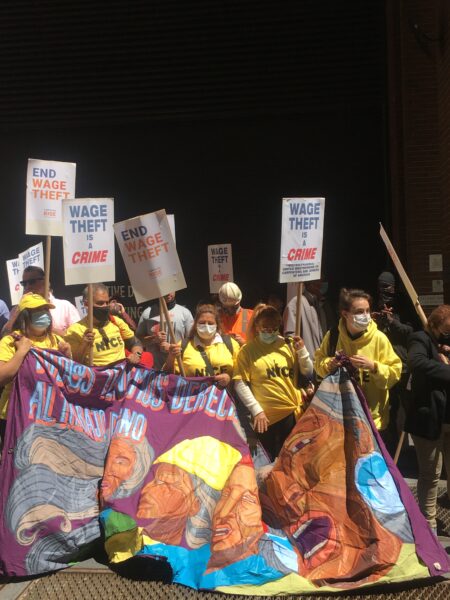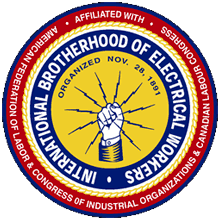
New York, NY – A growing number of prosecutors around the nation are beginning to treat wage theft and other offenses by employers as a criminal matter, instead of relegating enforcement to civil suits and regulatory agencies.
The law-enforcement system is very effective at pressing charges “if someone were to steal an individual’s cell phone, Michael Dougherty, district attorney of Colorado’s Boulder County, said during an online seminar organized by the Economic Policy Institute May 18. “Wage theft has a far greater effect on the individual.”
One important criterion, he said later, is that while crimes by individuals are often one-time actions, employers who cheat workers out of pay are usually repeat offenders; they don’t do it for just one week.
“Crimes against workers generally result from conscious decision-making,” the EPI said in a report released May 17. “Creating false payroll records; underreporting workers on unemployment insurance or workers’ compensation documents; shaving employee work hours or stealing tips; retaliating against employees who speak up when their rights are violated; paying no wages for an entire month or longer; assaulting minors or undocumented women workers; and eschewing critical and obvious workplace safety requirements are not inadvertent mistakes…. In addition, employer crimes often occur in clusters: The same employer who fails to pay workers is also evading UI and other taxes and violating workers’ compensation laws.”
The trend is relatively new. Over the last few years, prosecutors have set up specialized units to handle employer crimes statewide in New York and Minnesota, and locally in Brooklyn, Queens, Nassau County, Philadelphia, San Diego, and San Francisco. It’s been concentrated in left-leaning areas, but it includes mainstream Democrats such as Queens District Attorney Melinda Katz as well as “progressive prosecutors” like Philadelphia DA Larry Krasner and Chesa Boudin in San Francisco.
“This development represents a shift, because historically, crimes against workers have not generally been prosecuted,” the EPI report said. “More often, the criminal-justice system has intervened to protect employers; for example, a worker stealing from an employer would likely face charges, while an employer committing wage theft likely would not.” Or, as EPI senior fellow Terri Gerstein noted, it has been more likely to arrest strikers than to prosecute employers for evading workers-compensation taxes.
“We know wage theft is pervasive,” said Travis County (Austin, Texas) DA Jose Garza. Formerly head of the Workers Defense Project in Austin, he estimates that one out of every five construction workers in the state has been a victim.
“Working people are tired of no one ever being held accountable for it,” he said later.
The field is still new. In Minnesota, there is neither a developed set of instructions to explain the law to jurors, case law established by appeals-court decisions, nor guidelines for the length of prison sentences, said Susan Crumb, assistant county attorney in Hennepin County (Minneapolis). Garza, who took office in January, said his office is still laying the groundwork for how to proceed.
Another issue for prosecutors is whether to seek new laws to define wage theft as a crime or use statutes already on the books such as larceny, theft of services, or fraud. Colorado enacted a law defining wage theft as theft in 2019, and Minnesota did in 2020, but in New York, a bill to add it to the larceny section of the state penal code has gone nowhere.
In Philadelphia, the first prosecution by the new Worker Protection Unit began in 2019, when a lawyer for the city’s building-trades unions complained that a plumbing contractor had stopped contributing to the unions’ benefit funds. The unit initially didn’t want “to be seen as debt collector for the union,” said assistant DA Danielle Newsome, but there was clear evidence that “the employer took this money from the workers and ran with it.”
They decided to prosecute him for theft of the specific amount deducted from workers’ paychecks but not given to the union — $110,000 from 37 workers over 11 months, a felony because it was more than $100,000 — she said. They are working out a plea deal for restitution, probation, and community service, with criminal sanctions if the money isn’t paid back.
The vast majority of prosecutors rely on police to investigate allegations, Garza said. In Philadelphia, Newsome said, the DA’s in-house detective had never done this kind of case and was “overwhelmed” by the volume of documents. But the office put together a spreadsheet that made it easy to see the amount of deductions from each worker’s pay, and the detective contacted all the affected workers to confirm that they had not authorized the employer to keep the money.
The advantages of having a dedicated labor-crimes unit, the EPI report says, are that lawyers will develop expertise handling these often complex cases, including building relationships with worker organizations; auditing payroll and other employer records; and knowing common violations and problematic industries.
Garza said his office hopes to have its own investigative unit. Meanwhile, it’s talking to unions and workers centers, and preparing to resume in-person investigations.
Many victims of wage theft are immigrants, especially the undocumented. That means interviewing victims and witnesses requires more tact than usual. Immigrants distrust law enforcement, Garza said, so it’s important let them know that the government takes these offenses seriously and will protect them against being reported to Immigration and Customs Enforcement.
Dougherty believes Colorado should enact a law to define threatening to call ICE if someone reports a crime as extortion. “We can’t investigate these cases if we don’t know what’s happening out there,” he said.
One of the insidious effects of wage theft and other forms of fraud, building-trades unions regularly complain, is that law-abiding employers have to compete with those who are illegally undercutting them. In that situation, Crumb said, prosecution is a great deterrent.
The conviction of a labor broker who hired undocumented immigrants and didn’t pay them; classified them as independent contractors to evade paying for overtime, workers’ compensation, and unemployment benefits; and told them they’d be deported if they reported being injured on the job, she said, “sent shock waves through the construction industry” in the Twin Cities area, she said.
“‘Not getting away with it’ is a great message to send.”



